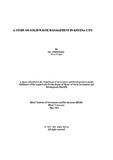| dc.contributor.advisor | Khan, Niaz Ahmed | |
| dc.contributor.author | Halim, Md. Abdul | |
| dc.date.accessioned | 2021-09-23T04:25:01Z | |
| dc.date.available | 2021-09-23T04:25:01Z | |
| dc.date.copyright | 2021 | |
| dc.date.issued | 2021-05 | |
| dc.identifier.other | ID: 18372002 | |
| dc.identifier.uri | http://hdl.handle.net/10361/15040 | |
| dc.description | This thesis is submitted in partial fulfillment of the requirements for the degree of Masters of Arts in Governance and Development, 2021. | en_US |
| dc.description | Cataloged from PDF version of thesis report. | |
| dc.description | Includes bibliographical references (pages 35-37). | |
| dc.description.abstract | As a populous and rapidly growing country, Bangladesh has been facing major
environmental crises over the years. Ineffective management of solid wastes especially in the
context of urban landscapes constitutes on the most pressing problems that contributes to
systematic deterioration of the environment. As a representative of rapidly expanding urban
area of the country, Khulna city faces full burnt of this problem. So the problem needs to be
carefully studied and observed. Major objectives of the study are: (1) To review the current
status of SWM in Khulna city (2) To assess the major problems and limitations (3)To explore
ways of improvement in SWM in the study area. Major methods that have been used in the
study are Key Informant Interview (KII), Focused Group Discussion (FGD), Secondary
Literature Review, Official Documents Review and Personal Observation (PO). Key
Informant Interview and Focused Group Discussion were held in Khulna city area with the
participation of the relevant stakeholders to be aware of the present situation of solid waste
management, existing problems and to find out probable solution of the problems. With a
view to doing the research, the review of relevant circular, office orders, manuals, regulations
related to solid waste management have been done. Selected major findings of the study
include the following: (1) The current status of solid waste management in Khulna city shows
that the present waste management system is not a satisfactory one rather it is
environmentally harmful and hazardous to public health and safe human living. Thereby it
requires an improvement from the perspective of environment and sustainable development.
(2) The major policy and operational level problems of solid waste management can be
summed up as Organizational constraints, Lack of community participation, Non integration
from informal sectors activity, Inefficient collection and disposal practices, Absence of
resource recovery component and Lack of human resources and vehicles. Besides, this
research generates some recommendations on the basis of the exploratory analyses and
explanations. These include the following: Organizational Capacity building, recruiting
skilled human resources and introducing of modern vehicles, Local level recycling,
introducing of resource recovery process, Sanitary landfill can bring fruitful changes to
existing solid waste management system in KCC area. | en_US |
| dc.description.statementofresponsibility | Md. Abdul Halim | |
| dc.format.extent | 37 Pages | |
| dc.language.iso | en_US | en_US |
| dc.publisher | BRAC University | en_US |
| dc.rights | Brac University theses are protected by copyright. They may be viewed from this source for any purpose, but reproduction or distribution in any format is prohibited without written permission. | |
| dc.subject | Solid Waste Management | en_US |
| dc.subject | Khulna city | en_US |
| dc.subject | Study | en_US |
| dc.title | A study on solid waste management in Khulna city | en_US |
| dc.type | Thesis | en_US |
| dc.contributor.department | Brac Institute of Governance and Development, Brac University | |
| dc.description.degree | M. Governance and Development | |

